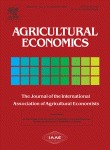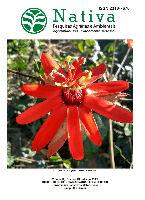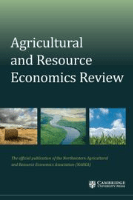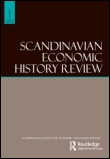
AGRICULTURAL HISTORY REVIEW
Scope & Guideline
Illuminating the Intersection of History and Agriculture
Introduction
Aims and Scopes
- Historical Analysis of Agricultural Practices:
The journal frequently publishes studies that analyze historical agricultural practices, examining how they have evolved over time and their implications for modern agriculture. - Social and Economic Implications of Agriculture:
A significant focus is placed on the socio-economic factors surrounding agricultural development, including labor dynamics, rural communities, and the impact of agricultural policies on society. - Environmental Histories:
The journal includes research on the environmental impacts of agriculture, exploring how agricultural practices have shaped landscapes and ecosystems throughout history. - Cultural and Gender Perspectives:
There is a consistent emphasis on the cultural aspects of agriculture, including the roles of women in agricultural history and the cultural significance of farming practices. - Transnational and Global Agricultural Histories:
The journal also addresses agricultural histories from a global perspective, examining the interconnectedness of agricultural practices across different regions and cultures. - Animal and Plant Domestication Studies:
Research on the domestication of plants and animals is another core area, providing insights into the historical development of agriculture.
Trending and Emerging
- Climate Change and Agriculture:
With increasing awareness of climate change, there is a growing trend in examining historical agricultural practices in relation to environmental changes and climate impacts. - Food Security and Political Economy:
Research focusing on food security and the political economy of agriculture has gained prominence, addressing the socio-political factors that influence food production and distribution. - Cultural Histories of Food:
There is an emerging interest in the cultural histories of food, exploring how food practices shape identities and social relations in various contexts. - Globalization and Agricultural Trade:
Studies on the globalization of agriculture and its historical context are trending, reflecting the complexities of agricultural trade networks and their impacts on local economies. - Animal Studies in Agricultural Contexts:
The integration of animal studies into agricultural history is gaining traction, examining the roles of animals in farming systems and their historical significance.
Declining or Waning
- Medieval Agricultural Practices:
Research focusing specifically on medieval agricultural practices has decreased, possibly due to a shift towards more contemporary historical analyses that address current agricultural challenges. - Local Agricultural Economies:
There has been a noticeable reduction in studies centered on local agricultural economies, suggesting a broader focus on global agricultural trends and policies instead. - Traditional Farming Techniques:
Papers exploring traditional farming techniques and their historical context have become less common, indicating a potential shift towards modernization themes in agricultural history. - Historical Agricultural Technology:
The exploration of historical agricultural technologies, such as tools and machinery used in past farming practices, seems to have waned, possibly overshadowed by discussions of current technological innovations.
Similar Journals

AGRICULTURAL ECONOMICS
Innovating agricultural practices through rigorous research.AGRICULTURAL ECONOMICS, published by Wiley, is a premier journal dedicated to advancing the understanding of agricultural economics, with an ISSN of 0169-5150 and an E-ISSN of 1574-0862. This esteemed publication serves as a vital resource for researchers, professionals, and students in the fields of Agronomy and Crop Science, as well as Economics and Econometrics, consistently reflecting its high standing as evidenced by its 2023 Q1 ranking in both categories. With a comprehensive scope spanning from 1986 to 2024, the journal presents rigorous analysis and innovative research that informs policy decisions and enhances agricultural practices globally. Although it does not provide open access options, the rich academic content invites a dedicated readership committed to strengthening the agricultural sector through evidence-based insights. The journal is particularly noted for its impressive Scopus rankings, placing it among the top-tier resources for understanding the complex interplay between economic theory and agricultural development.

Asian Journal of Agriculture and Development
Transforming agricultural practices through rigorous scholarship.Asian Journal of Agriculture and Development is a prestigious academic journal dedicated to advancing the field of agricultural research and development within the context of Southeast Asia. Published by the Southeast Asian Regional Center for Graduate Study and Research in Agriculture, this journal plays a vital role in disseminating innovative findings and best practices critical for sustainable agricultural development in the region. With a focus on interdisciplinary studies that integrate agricultural science, policy development, and socio-economic factors, the journal invites researchers, professionals, and students to contribute rigorous research that addresses contemporary challenges faced by the agriculture sector. Although it operates within a non-open access framework, the journal aims to ensure wide visibility and accessibility of its publications through strategic collaborations and institutional partnerships. By engaging with its content, stakeholders can gain valuable insights and foster meaningful dialogue that drives forward agricultural progress in Asia.

Agricultural Economics-Zemedelska Ekonomika
Innovating agricultural practices through economic analysis.Agricultural Economics-Zemedelska Ekonomika is a prominent open-access journal published by the Czech Academy of Agricultural Sciences, dedicated to advancing the field of agricultural economics and related disciplines. Since its inception in 2007, this journal has provided a vital platform for researchers, professionals, and students to disseminate and engage with cutting-edge insights and empirical studies that contribute to the understanding of agricultural practices, economic theories, and policy analysis. With an impressive impact factor reflected in its 2023 quartile rankings of Q2 in both Agricultural and Biological Sciences and Economics, Econometrics and Finance, the journal ranks highly among its peers, specifically occupying the 46th position out of 288 in General Economics and 40th among 193 in Agricultural Sciences, highlighting its broad relevance and respected status. The journal's open access model ensures that research is widely disseminated and easily accessible, fostering an inclusive academic environment that encourages collaboration and knowledge sharing. With a commitment to publishing quality research until at least 2024, Agricultural Economics-Zemedelska Ekonomika remains a crucial resource for those dedicated to improving agricultural productivity and sustainability through economic insight.

TROPICAL AGRICULTURE
Driving research excellence in tropical farming practices.Tropical Agriculture is a reputable journal dedicated to advancing knowledge and research in the fields of Agronomy and Development, with a particular emphasis on tropical farming practices and agricultural innovation. Published by the University of the West Indies, this journal serves as a crucial resource for researchers, professionals, and students engaged in the complexities of agriculture in the tropics. Established in 1979, it has witnessed significant contributions and continues to facilitate scholarly discussions through its quarterly publications. While the journal currently holds a Q4 ranking in both the Agronomy and Development categories, its commitment to fostering research excellence positions it as a pivotal platform for emerging studies and regional agricultural advancements. Although not an open-access publication, it provides critical insights and localized research that greatly benefit the agricultural community, particularly within the Caribbean context. Researchers and professionals in the field can rely on this journal for insightful content on tropical agricultural challenges and developments, enhancing knowledge dissemination and application across related disciplines.

Economia Agraria y Recursos Naturales
Exploring Sustainable Solutions for Agriculture and NatureEconomia Agraria y Recursos Naturales, published by UNIV POLITECNICA VALENCIA, EDITORIAL UPV, is a prominent open-access journal that has been serving the fields of agricultural and biological sciences, environmental science, and geography since 2001. With an ISSN of 1578-0732 and an E-ISSN of 2174-7350, this journal is dedicated to publishing high-quality research that contributes to the sustainable management of natural resources and agricultural practices. The journal invites scholars, practitioners, and students to explore and share innovative findings that address pressing environmental challenges. While currently categorized in the lower quartiles (Q4) for various disciplines in 2023, its open-access model ensures wide dissemination and visibility for authors and their work, aligning with the growing trend towards accessibility in academic publishing. Positioned in Spain, Economia Agraria y Recursos Naturales is a valuable resource for those seeking to engage with the intersection of agriculture, environmental studies, and policy planning within a global context.

Nativa
Bridging science and sustainability through research.Nativa, published by the Universidade Federal de Mato Grosso in Brazil, stands as a prominent open-access journal since 2013, dedicated to the dissemination of research across various domains of Agricultural and Biological Sciences. With its ISSN 2318-7670, Nativa aims to foster scholarly communication and collaboration among researchers and practitioners worldwide. The journal occupies notable positions within the Scopus rankings, with a Q3 classification in several categories, including Agricultural and Biological Sciences (miscellaneous) and Environmental Science (miscellaneous), while also holding a Q4 classification in areas such as Agronomy and Crop Science and Animal Science and Zoology. This positioning reflects its commitment to advancing knowledge and understanding crucial to sustaining and enhancing our natural resources. Nativa seeks to engage a diverse readership by providing a platform for innovative research, fostering interdisciplinary discourse, and addressing pressing environmental challenges and conservation efforts essential for sustainable development.

AGRICULTURAL HISTORY
Exploring the Roots of Agriculture and HistoryAGRICULTURAL HISTORY, published by DUKE UNIVERSITY PRESS, is a prominent academic journal that has been a vital resource in the fields of agricultural sciences and historical studies since its inception in 1975. With an ISSN of 0002-1482 and E-ISSN of 1533-8290, this journal holds an impressive reputation reflected in its SCImago rankings: it ranks in the Q2 quartile in Agricultural and Biological Sciences (miscellaneous) and Q1 in History, highlighting its relevance and scholarly impact. The journal serves as a platform for groundbreaking research that explores the intricate relationships between agriculture and society throughout history. Though not an open access journal, the content is widely regarded for its rigor and depth, appealing to researchers, professionals, and students interested in understanding the role of agriculture in shaping historical narratives and contemporary issues. The journal remains committed to advancing knowledge within its scope while fostering critical discourse across disciplines.

Agricultural and Resource Economics Review
Fostering Interdisciplinary Insights in Resource EconomicsAgricultural and Resource Economics Review is a leading peer-reviewed academic journal published by Cambridge University Press, dedicated to advancing scholarship in the fields of agricultural and resource economics. Since achieving Open Access status in 2016, it has significantly broadened its reach, allowing researchers, professionals, and students across the globe to engage with cutting-edge research and innovative methodologies. The journal, which boasts an impact factor reflective of its strong standing in both Agronomy and Crop Science (Q2) and Economics and Econometrics (Q2), aims to provide a platform for the dissemination of high-quality research that informs policy and practice in the agricultural sector. With a publication history spanning from 2004 to 2024, the journal continuously strives to foster interdisciplinary exchange and contribute vital insights that shape sustainable resource management. Emphasizing quantitative analysis and empirical research, Agricultural and Resource Economics Review remains a crucial resource for those involved in the dynamics of agricultural economics and resource management in today's ever-evolving landscape.

SCANDINAVIAN ECONOMIC HISTORY REVIEW
Bridging Disciplines to Illuminate Economic HistorySCANDINAVIAN ECONOMIC HISTORY REVIEW, published by ROUTLEDGE JOURNALS, TAYLOR & FRANCIS LTD, stands as a significant scholarly platform dedicated to the exploration and analysis of economic history within the Scandinavian context. With an ISSN of 0358-5522 and an E-ISSN of 1750-2837, this journal has been publishing high-quality research since 1953 and continues its contribution to academia with a projected publication span extending to 2024. Renowned for its rigorous scholarship, the journal enjoys a commendable standing in the academic community, reflected in its Q1 classification in History and its competitive rankings across multiple categories. The journal particularly champions transdisciplinary approaches, encouraging researchers to engage with economic history through various lenses including the arts, humanities, and social sciences. Despite operating on a traditional access model, the impactful content delivered within its pages offers invaluable insights for researchers, professionals, and students striving to deepen their understanding of the economic transformations in Scandinavian societies.

REVISTA DE LA FACULTAD DE CIENCIAS AGRARIAS
Fostering Collaboration in Agricultural Excellence.REVISTA DE LA FACULTAD DE CIENCIAS AGRARIAS is an esteemed academic journal published by UNIV NACIONAL CUYO, FAC CIENCIAS AGRARIAS, located in Chacras de Coria, Mendoza, Argentina. As a pivotal publication in the fields of Agronomy and Plant Science, it has achieved a commendable Q2 ranking in both categories, indicating its relevance and impact within the scientific community. Since its establishment as an Open Access journal in 2007, it has facilitated the dissemination of crucial research, fostering collaboration and innovation among researchers, professionals, and students alike. The journal's converged years from 2008 to 2024 allow it to present contemporary advancements and discussions related to agricultural practices and plant sciences. With a strong commitment to quality and accessibility, REVISTA DE LA FACULTAD DE CIENCIAS AGRARIAS provides a valuable platform for those engaged in the crucial exploration of sustainable agricultural methodologies and plant innovations.